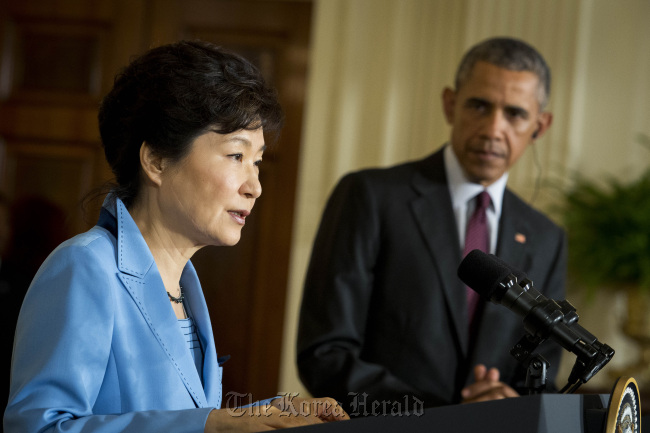Though Seoul had managed to boost prospects for greater U.S. attention to North Korea through last week’s summit, it highlighted an increasingly convoluted dilemma between its traditional ally and a rising China amid their intensifying rivalry for regional supremacy.
The Park Geun-hye administration has been boasting that its bilateral relations with the U.S. and China are at their “best-ever.” After appearing alongside Chinese leader Xi Jinping at a massive military parade in Beijing last month, she took the podium with U.S. President Barack Obama at the White House over the weekend, showing off their rapport and voicing in unison against Pyongyang’s nuclear ambitions.
 |
President Park Geun-hye (left) speaks as her U.S. counterpart Barack Obama looks on at a news conference at the White House in Washington on Friday. (Bloomberg-Yonhap) |
Yet, fueled in part by Japan’s extensive lobbying, concerns have risen since her swearing-in in February 2013 in the government and academic circles in Washington that South Korea was “leaning” toward China, while toughening its line against Japan, due to historical and territorial tensions, shunning the trilateral security cooperation sought by the U.S.
Park’s address at the Center for Strategic and International Studies on Thursday demonstrated Seoul’s efforts to tackle the view. Unveiling its plan for a three-way summit with Beijing and Tokyo, she displayed her willingness to meet one-on-one for the first time with Japanese Prime Minister Shinzo Abe to provide a chance for the two countries to “clear away obstacles hindering closer bilateral ties.”
While some observers said her trip to the U.S. helped offset what critics have called “history fatigue,” the deepening quandary was laid bare once again at her joint news conference with Obama the following day as he urged Park to “speak out” if China fails to abide by international norms and rules.
“Just as we do, because we think that both of our countries have benefited from the international norms and rules that have been in place since the end of World War II,” Obama said.
“And we don’t want to see those rules of the road weakening, or some countries taking advantage because they’re larger. That’s not good for anybody ― including South Korea.”
Though his remarks were accompanied by his support for a strong relationship between Seoul and Beijing, as well as the emerging power’s peaceful rise, they also indicated the potential of future friction between the longtime allies when the Sino-U.S. rivalry escalates, such as over trade, currency or maritime security.
First and foremost at stake are conflicts in the South China Sea. U.S. Assistant Secretary of State for East Asia and Pacific Affairs Daniel Russel has also called for Seoul to voice out against Beijing’s ongoing construction of artificial islands and other provocative acts near the islands claimed by some Southeast Asian countries.
After making the call at another CSIS forum last June, Russel once again said during a news conference one day before the Park-Obama summit: “It is a good thing for the leaders of China to hear directly from another democratically ― from a democratically elected president in a neighboring country” about its behavior regarding freedom of navigation and commerce.
“As the U.S. presidential election draws near and contenders engage in ‘China bashing’ next year, Seoul may come under pressure to make a tricky choice over delicate issues such as a possible stationing of advanced U.S. missile defense assets here, as it did when joining a China-led development bank early this year,” a diplomatic source said, requesting anonymity due to the sensitivity of the matter.
For the Park government to better position itself between the two world powers, it should craft a long-term strategy and practice policy in a manner that is consistent and serves national interests, a foreign policy expert said.
“I think the persistent criticism of her foreign policy stems from the lack of a grand vision and concrete action plans to realize it. Though it’s wise to sustain good relationships both with the U.S. and China, its policy should be consistent and persuadable to other countries,” he said, wishing to remain anonymous.
By Shin Hyon-hee (
heeshin@heraldcorp.com)








